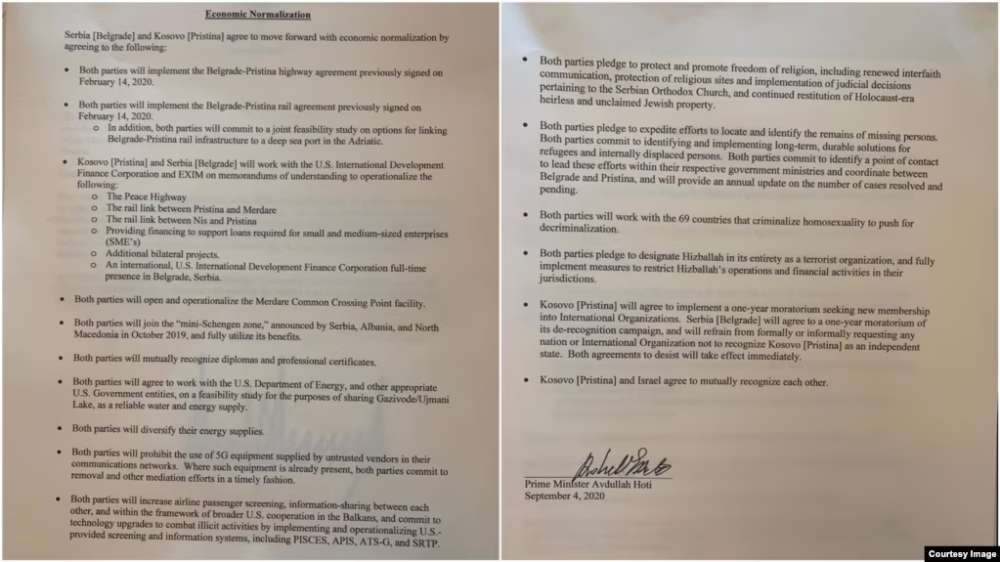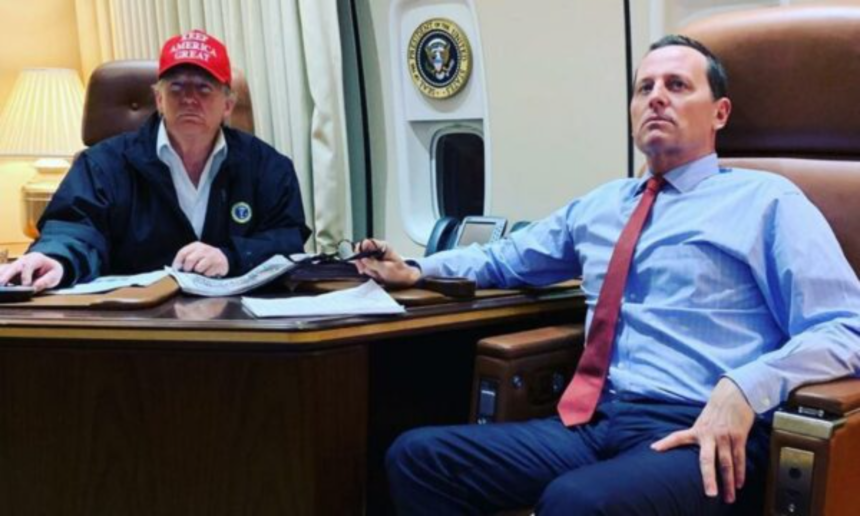During Donald Trump’s first term (2017-2021) as President of the United States, one of the notable chapters in foreign relations involved Kosovo and Serbia. Like the administration before him, Trump appointed an envoy to handle this issue. At that time, Trump, who was re-elected as the 47th President of the United States last Tuesday, entrusted the task to Richard Grenell, former U.S. Ambassador to Germany, who is expected to hold a senior position in Trump’s second term.
Under Trump’s leadership, a historic agreement was prepared to be signed at the time by Kosovo President Hashim Thaçi and Serbian President Aleksandar Vučić. However, the indictment against the former political leader of the Kosovo Liberation Army (KLA) caused complications for the Trump Administration’s attempt to secure a foreign policy success in the Western Balkans.
Despite this, Grenell did not halt efforts to bring about a Kosovo-Serbia agreement, which was set to be signed in the Oval Office. He invited Kosovo’s Prime Minister at the time, Avdullah Hoti, to the White House, where he signed the agreement and simultaneously secured Kosovo’s historic recognition from Israel.
But what did that agreement entail, and will the new Trump administration aim to revive it, especially since there has been little pressure from the Biden administration over the past four years for Kosovo and Serbia to implement the agreement?
On September 4, 2020, Kosovo Prime Minister Avdullah Hoti and Serbian President Aleksandar Vučić signed an agreement, called the “Economic Normalization Agreement,” at the White House in the presence of U.S. President Donald Trump.
Below are some key points of the agreement signed by the Kosovo side:
- Both parties will implement the agreement for the Belgrade-Pristina highway, signed on February 14, 2020.
- Both parties will implement the Belgrade-Pristina railway agreement, also signed on February 14, 2020. Additionally, both sides will commit to a feasibility study for connecting the Belgrade-Pristina rail infrastructure to a deep-sea port in the Adriatic.
- Kosovo (Pristina) and Serbia (Belgrade) will work with the U.S. International Development Finance Corporation (DFC) and EXIM Bank through memorandums of understanding to operationalize:
- The Peace Highway
- The Pristina-Merdare railway connection
- The Nish-Pristina railway link
- Securing financing for small and medium-sized enterprises
- Additional bilateral projects
- Full international presence in Belgrade by the U.S. International Development Finance Corporation.
- Both parties will open and operationalize the joint border checkpoint at Merdare.
- Both parties will join the “Mini-Schengen Zone,” declared by Serbia, Albania, and North Macedonia in October 2019, and fully utilize the benefits of it.
- Both sides will recognize each other’s diplomas and professional certificates.
- Both sides will agree to work with the U.S. Department of Energy and other U.S. government entities on a feasibility study to jointly use Lake Ujman as a secure supplier of water and energy.
- Both parties will diversify their energy sources.
- Both parties will ban the use of 5G equipment sourced from unreliable vendors in their communication networks. Where such equipment already exists, both parties commit to removing it and taking other mitigation efforts in due time.
- Both sides will enhance air passenger control, share information with each other, and within the broader framework of U.S. cooperation in the Balkans, engaging in technological updates to combat malicious activities, implementing U.S.-secured systems for control and information, including PISCES, APIS, ATS-G, and SRTP.
- Both parties pledge to protect and promote religious freedoms, including the renewal of interfaith communication, protecting religious sites, and implementing judicial decisions related to the Serbian Orthodox Church, as well as continuing the return of non-inherited properties from the Holocaust era and Jewish properties not claimed by anyone.
- Both parties commit to speeding up efforts to localize and identify the remains of missing persons. They also agree to identify and implement long-term, sustainable solutions for refugees and internally displaced persons. Both sides will designate a point of contact within their respective ministries to lead these efforts and coordinate them between Belgrade and Pristina, and update data on the number of resolved cases and ongoing ones each year.
- Both parties will work with 69 countries that consider homosexuality a crime to decriminalize it.
- Both parties agree to declare Hezbollah a terrorist organization and fully implement measures to limit Hezbollah’s operations and financial activities under their jurisdiction.
- Kosovo (Pristina) agrees to implement a one-year moratorium on seeking new memberships in international organizations. Serbia (Belgrade) agrees to implement a one-year moratorium on its campaign for non-recognition and will refrain from making any official or unofficial requests to any country or international organization to not recognize Kosovo (Pristina) as an independent state. All agreements on waiver will take immediate effect.
- Kosovo (Pristina) and Israel agree to recognize each other.
Post-Trump Developments and the Ohrid-Brussels Agreement
Kosovo Prime Minister Albin Kurti, who took office on February 14, 2021, following a severe rift with the Trump administration, stated that he would not send the Washington Agreement to the Kosovo Assembly for approval. He even warned of a potential review of the agreement with Israel regarding the relocation of Kosovo’s embassy.
The Biden administration had said that it would push forward the Washington Agreement. However, aside from the feasibility study for Lake Ujman, no significant developments have occurred regarding the implementation of the Washington Agreement.
After Biden took office, the position of a presidential envoy was not renewed, and the Kosovo-Serbia dialogue was relegated to the portfolio of the Deputy Assistant Secretary of State. Washington did not get directly involved as it did during the Trump administration, and the European Union was fully entrusted with the powers to mediate the dialogue. For nearly four years, Kosovo and Serbia reached another legally binding agreement, brokered by the European Union in Ohrid and Brussels, which is officially part of the integration path of both countries. In this agreement, Kosovo must establish the Association of Serb-majority Municipalities, a demand that both the U.S. and the EU have insisted upon for many years.
It remains to be seen what approach the new Trump administration will take toward the Kosovo-Serbia dialogue process. Whether Washington will pressure for the implementation of the Brussels-Ohrid Agreement or whether Trump will attempt to revive the Washington Agreement for implementation is still unclear.








